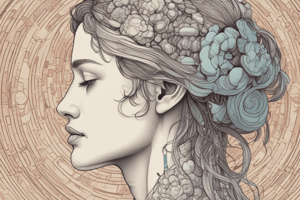Podcast
Questions and Answers
What percentage of females experience headache as a common symptom in clinical practice?
What percentage of females experience headache as a common symptom in clinical practice?
- 85%
- 90%
- 99% (correct)
- 95%
Which of the following is not a pain-sensitive structure in the cranium?
Which of the following is not a pain-sensitive structure in the cranium?
- Arteries
- Muscles
- Pericranium
- Skull bone (correct)
What is the primary step in evaluating a patient with headache?
What is the primary step in evaluating a patient with headache?
- Ordering imaging studies
- Prescribing pain medications
- Performing a physical exam
- Taking a detailed history (correct)
Which of the following cranial nerves is not pain-sensitive?
Which of the following cranial nerves is not pain-sensitive?
What is the term for headache associated with vascular disorders?
What is the term for headache associated with vascular disorders?
What percentage of females and males are affected by migraine?
What percentage of females and males are affected by migraine?
What is the term for headache referred from diseases of the neck?
What is the term for headache referred from diseases of the neck?
What is a common precipitating factor of migraine attacks?
What is a common precipitating factor of migraine attacks?
How often may migraine attacks occur?
How often may migraine attacks occur?
What is a diagnostic criterion for migraine without aura?
What is a diagnostic criterion for migraine without aura?
What is a general measure for managing migraine?
What is a general measure for managing migraine?
What medication may be used during a migraine attack?
What medication may be used during a migraine attack?
What is the typical duration of a tension type headache?
What is the typical duration of a tension type headache?
Which of the following medications is NOT typically used to treat cluster headaches?
Which of the following medications is NOT typically used to treat cluster headaches?
What is a characteristic of cluster headaches?
What is a characteristic of cluster headaches?
What is often associated with tension type headaches?
What is often associated with tension type headaches?
What is the primary mechanism of action of Sumatriptan?
What is the primary mechanism of action of Sumatriptan?
What is a common symptom of cluster headaches?
What is a common symptom of cluster headaches?
Study Notes
Headache
- Headache is a common symptom in clinical practice, affecting 93% of males and 99% of females.
- It is a symptom of an underlying disease that requires further investigation.
Classification of Headache
- Migraine
- Tension type headache
- Cluster headache
- Headache associated with vascular disorders
- Headache associated with head trauma
- Cranial neuralgia
- Headache associated with non-vascular intracranial disorders
- Headache referred from diseases of the skull bone, neck, etc.
Migraine
- More common in females (15-20%) than males (5-10%)
- Strong family history is present
- Onset: at or shortly after puberty
- Frequency: may occur 2-3 times/week, decreasing with age
- Precipitating factors: excitement or excessive work, menses, bright light, extra sleep, strong smells, certain diets
- Diagnostic criteria:
- A. At least 5 attacks fulfilling B-D criteria
- B. Headache attacks lasting 7-48 hours
- C. Headache has at least two of the following: unilateral, pulsating, moderate/severe, aggravated by walking
- D. During headache, at least one of the following: nausea and/or vomiting, photophobia and phonophobia
Management of Migraine
- General measures: avoidance of stressful situations, mental and physical fatigue, precipitating diet elements, dealing with other precipitating factors
- Medical measures: during the attack, strong analgesics (e.g., aspirin, paracetamol), ergot preparation (e.g., Migranil) oral, IM or suppository
Tension Type Headache
- Frequently associated with anxiety, depressive disorders, and insomnia
- The commonest type of headache (68% of males and 88% of females)
- Each attack lasts from 30 minutes up to 7 days
- At least two of the following: pressing/tightening quality, mild or moderate, bilateral location, no aggravation as in migraine
- No nausea or vomiting, no phonophobia or photophobia
- May be associated with spasm of or tender pericranial muscles
- Usually precipitated by stressful situations, associated with insomnia, lost appetite
- Treatment: analgesics, muscle relaxants, antidepressants, anxiolytics
Cluster Headache
- Severe unilateral orbital, supra-orbital, and/or temporal pain
- Lasting 15-180 minutes
- Recurrent attacks over the day and may awaken the patient from sleep
- Headache is associated with at least one of the following on the pain side:
- Lacrimation
- Nasal congestion
- Miosis
- Eyelid edema
- Conjunctival injection
- Rhinorhea
- Ptosis
- Forehead and facial sweating
Studying That Suits You
Use AI to generate personalized quizzes and flashcards to suit your learning preferences.
Description
A comprehensive overview of headaches, including the definition, symptoms, and diagnostic approach. Learn about the essential questions to ask patients and the key aspects to consider during diagnosis.




